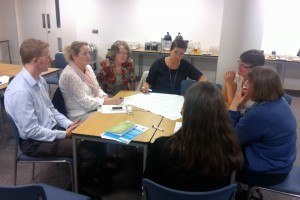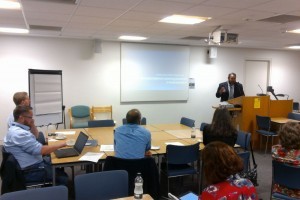Biosciences in Nurse Education (BiNE) Autumn meeting 12th September 2016, Faculty of Health, Education and Life Sciences, Birmingham City University
 I recently joined the BiNE Group and attended what turned out to be a stimulating and fascinating autumn meeting at Birmingham City University. In attendance from higher education institutions across the UK was a mix of both bioscientists and nurses. It was clear that all present were united in one main aim, to improve nurses’ knowledge, understanding and application of bioscience, with the ultimate aim of improving patient outcomes. The following summary of the meeting may be of interest not only to those involved in nursing education, but anyone involved in teaching bioscience, particularly in the health professions.
I recently joined the BiNE Group and attended what turned out to be a stimulating and fascinating autumn meeting at Birmingham City University. In attendance from higher education institutions across the UK was a mix of both bioscientists and nurses. It was clear that all present were united in one main aim, to improve nurses’ knowledge, understanding and application of bioscience, with the ultimate aim of improving patient outcomes. The following summary of the meeting may be of interest not only to those involved in nursing education, but anyone involved in teaching bioscience, particularly in the health professions.
How best to assess students in bioscience?
Dr Ehsan Khan from King’s College London began the morning session which was themed around techniques of assessment by describing the online examinations he had introduced for three modules (anatomy and physiology, and pharmacology). This included considerations related to solving the practicalities of having students sitting close to each other in a computer lab, more students than computers and what to do in the event of a power-cut!
The tests consisted of different types of question with marking weighted on the basis of a question being at level one e.g. a multiple-choice question (MCQ) testing a single concept; level two e.g. assertion-reasoning question testing 1-2 concepts; or level three e.g. question encompasses multiple complex concepts. MCQs are not thought of very highly by some, but Ehsan was convincing in explaining that, if written correctly, they can assess the application of complex concepts. Online examination is a great approach in that the marking is done automatically, but a large bank of questions is required. It is being proposed that members of BiNE combine forces to create a national bank of questions which could mitigate considerably against the time needed to write good quality questions – apparently this already occurs in medical education. The more BiNE members available for this the better!
Dr Laura Ginesi, University of East Anglia then expounded further on the use ofassertion-reasoning questions which require a higher level of learning than MCQs or true/false questions. They appear to be of real value in the assessment of critical thinking. Finally, Dr Sarah Greenwood of City, University of London, described the use of short-answer type questions in assessing bioscience. She argued that this type of question allowed the students to fully express what they knew and provide depth to an answer, and considered this to be of value in part due to the large number of students she had with additional learning needs or from widening participation backgrounds, similar perhaps to that at the Faculty of HSS at BU – an important and interesting consideration albeit marking time needs to be taken into account too.

One of two team discussing how best to disseminate the Quality Assurance Framework for Biosciences Education in Nursing
Why bioscience, and what learning outcomes?
In the afternoon it was announced that a virtual edition of the Journal of Clinical Nursing was being devoted to biosciences in nursing was hot off the press. A great read for anyone wanting to get up-to-date with the current state of play. Discussion was also given over to dissemination of the BiNE publication, ‘Quality Assurance Framework for Biosciences Education in Nursing’ (July 2016) which sets out learning outcomes in bioscience recommended for pre-registration nursing education. It is an aim of the group that this document plays an influential part in the development of future nursing degree programmes.
How best to learn, teach and assess bioscience?
It was agreed that BiNE members would provide case studies of the approaches they take towards promoting student engagement and learning in bioscience. These should start to appear on the BiNE website over the coming months. I’ll let you know when mine is there!
Want to join BiNE?
If this group interests you and you’d like to find out more, click here – equally I’m happy to hear from anyone who has questions.
Jonny Branney
jbranney@bournemouth.ac.uk









